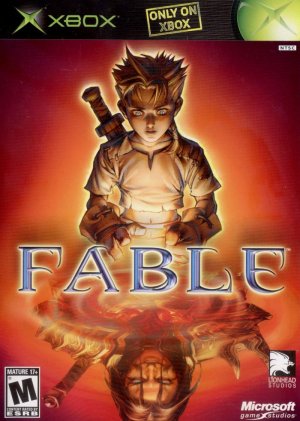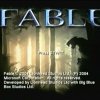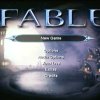At the town of Oakvale, in the land of Albion, a boy is sent on an errand by his father to get his sister a birthday present. When the deed is done, destiny unravels: the once peaceful town is suddenly under attack by bandit raids. The frightened child soon discovers his world crumbling in a matter of moments. Lying beside the body of his dead father, the boy is attacked by the gang, but is fortunately saved by a hero called Maze. He is then taken to the Heroes Guild where he is raised. Time has passed and the child has grown, and is ready to take up his own quest to rid the land of monsters and discover who was responsible for the deaths of his family.
Fable is a third-person action role-playing game that casts the player as “the child” or “the hero” who must perform various deeds to graduate from the Heroes Guild and define himself. The story progresses when the hero chooses “main quest items” from the Guild. Alternatively, there are also other quests that the player may complete in order to obtain gold and fame. Some quests allow the hero to “boast” in front of his fans. Boasting before a quests adds added difficulty, such as “completing the quest naked,” however will allow additional gold and fame to be obtained.
The game introduces a “good and evil” morality system, similar to that of Knights of the Old Republic. Various situations - for example coming across a child being bullied - will force the player to make decisions which ultimately shape the main character. Making decisions deemed “good” earns the player good points, while being selfish and “bad” earns evil points instead. These decisions not only alter character stats, but also the hero’s appearance and even the environment around them. “Evil” characters tend to look the part; growing horns, receiving scars and having a swarm of flies buzzing around him. A “good” character, on the other hand, might receive a halo and have butterflies swarming. However, other actions such as receiving wounds in combat or casting large amounts of magic also affect the player’s appearance.
Actions also end up impacting the player’s reputation, including actions that might be relatively unimportant in other games. For instance, if a player kicks a lot of chickens, various people might start referring to them by the title of “Chicken Chaser”; using “good” alignment magic might cause people to start calling the hero “Runemaster” instead.
There are three main modes of combat in Fable: melee, ranged and magic. The hero can equip any number of weapons, from swords to axes, and a variety of spells to either harm or help. What the hero wears also determines how people interact with them. Bright, saintly armor tends to make townspeople more willing to talk, while carrying a large axe and blood-red, darkened armor might cause them to be more apprehensive.
An experience upgrade system allows the player to specialize in one area, or spread throughout, to give the hero a more all-around set of abilities. There are three areas in which experience is gained: Physical, Skill and Will. Physical experience is earned primarily by using melee weapons and can be used to upgrade the hero’s strength or health. Skill experience is primarily gained through archery or trading and boosts archery prowess, speed or guile. Will experience is gained through magic usage and is spent on new spells or upgrading old ones.




